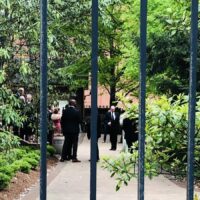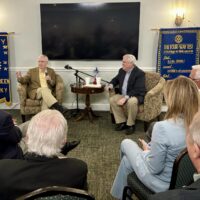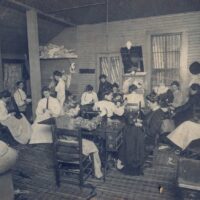The United States is getting back into the TNT game for the first time in nearly four decades.
U.S. Senate Minority Leader Mitch McConnell made the announcement Friday alongside local and federal Kentucky officials and members of the U.S. military in Greenville.
During a press conference at the local VFW Post, McConnell identified trinitrotoluene — better known as TNT — as a critical explosive for Air Force weaponry, from hand grenades to aircraft bombs, and a key investment priority for the Army.

That U.S. investment comes courtesy of a $435 million military contract for Repkon USA — an aerospace and defense manufacturer — to build and operate the first domestic source of the explosive chemical in Kentucky.
McConnell said the future Muhlenberg County facility is part of a larger effort “to get America ready to prevent war by being strong.”
“If I had to describe where we are today, I would say it looks like before World War II,” the Republican leader said. “Let me tell you where we are: We’re up against a network, an actual network, of authoritarian regimes — North Korea, China, Russia, Iran. Iran and Iran’s proxies are all communicating with each other. They hate us, and they want to reform the world order in a way that benefits autocratic regimes.
“So a way to look at this is an impending conflict between authoritarian parts of the world and democratic parts of the world, and we have to be the lead.”
After the presentation, McConnell said that “it’s cheaper to prevent war than it is to have one” and referenced former President Ronald Reagan as he called for increased military defense spending by the U.S., calling the country’s current spending levels “nowhere near adequate.”
“We need to build up our defense industrial complex and spend more in order to avoid having to spend even more in a conflict. As Reagan said it, ‘You get peace through strength.’”
Maj. Gen. John G. Reim commands the Picatinny Arsenal in New Jersey, which is home to 90% of the United States Army’s lethality. He spoke in Greenville about the Army’s need to expand production capacity when it comes to 155 mm artillery – a variable type of munition that’s become a critical component in the conflict between Russia and Ukraine.
Reim said he hopes for U.S. production of 155 mm artillery to hit 100,000 “shots” — finished rounds with a fuse, an explosively loaded steel projectile principally filled with TNT, a propelling charge and a primer — a month by 2026.
“This new TNT facility is a key part of our munitions production ramp up strategy giving us the added capacity to stay ahead of evolving threats and production requirements,” Reim said. “This history-making initiative underscores our commitment to strengthening our national security and reducing reliance on foreign sources for critical materials.”
Reim said that making TNT on American soil for the first time since 1986 is the best way to meet that commitment.
Repkon USA president Bryan Van Brunt said the facility will increase the resiliency of the United States by ensuring “critical capability for the U.S. military that packs explosive punch.”
“This unique facility will not be like the TNT plants of decades past,” he said. “This TNT facility is going to take advantage of state of the art automation and a novel waste neutralization process to make it one of the most high-tech, safe and environmentally friendly TNT plants ever constructed.”
The Environmental Protection Agency has identified trinitrotoluene as a possible human carcinogen. Guidance from the Centers for Disease Control and Prevention links the compound with adverse health impacts like blood disorders, abnormal liver function, spleen enlargement and anemia.
Scientists have strived to develop alternatives to TNT over the past decade because of the compound’s environmental properties and its explosive sensitivity.
When asked if Repkon had considered manufacturing alternatives like IMX-101 — which got Army approval in 2010 — or BOM, Van Brunt said this will be a safer TNT facility than those of the past.
“TNT is a proven explosive that’s been used in military munitions for decades and decades. The question is whether it can be produced safely in an environmentally friendly fashion — and it can be,” he said.
“One issue with TNT over many years is it’s being produced in World War II-era plants. Back then, the methods of production were a bit different. We’re going to use … the same chemical process [but] it’s a different production method altogether. There won’t be any wastewater, and it will be done in a way to not put out the pollutants.”
Van Brunt said he expects to break ground on the factory in six months with the first batches of TNT coming off the line in around three years. The planned facility in Graham, an unincorporated community of Muhlenberg County, will create around 50 permanent jobs.
McConnell called the announcement an “absolutely spectacular development” for the western Kentucky area.
“This is a breath of fresh air for Muhlenberg County, and an opportunity to be involved in something that’s extremely important for our nation,” he added.
Local officials and veterans were also on hand to celebrate the military contractor coming to the community — which has a history of producing explosives through manufacturers like Dyno Nobel, also located in Graham.
“We’ve been actually at the mercy of other countries for this product that’s going to be built here,” said Muhlenberg County Judge-Executive Mack McGehee. “This is a great day for the United States, bringing this industry back.”
Joe Roney — a Vietnam veteran, the senior commander of the local VFW post and a native of Powderly in Muhlenberg County — was overjoyed at the announcement.
“We’ve had explosive plants out there anyway. I think this county is going to receive this very well,” he said. “I’m one of the biggest military supporters there is. I’m happy for it.”
(This story first ran on WKMS, the public radio station at Murray State University.)






